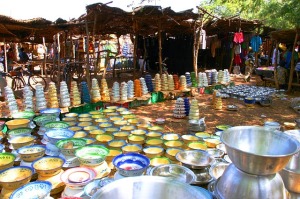Africa’s Golden Opportunity To Engage the United States on Trade and Investment at the U.S. – Africa Leaders Summit
 On January 21, 2014, the White House announced the first U.S.-Africa Leaders Summit in Washington, DC to take place on August 5 and 6, 2014. President Obama invited leaders from across the African continent with the aim of strengthening ties with one of the world’s most dynamic and fastest-growing regions. Six of the world’s ten fastest growing economies of the past decade are in sub-Saharan Africa. According to the White House Press Release, “[t]he Summit will build on the progress made since the President’s trip to Africa last summer, advance the Administration’s focus on trade and investment in Africa, and highlight America’s commitment to Africa’s security, its democratic development, and its people.”
On January 21, 2014, the White House announced the first U.S.-Africa Leaders Summit in Washington, DC to take place on August 5 and 6, 2014. President Obama invited leaders from across the African continent with the aim of strengthening ties with one of the world’s most dynamic and fastest-growing regions. Six of the world’s ten fastest growing economies of the past decade are in sub-Saharan Africa. According to the White House Press Release, “[t]he Summit will build on the progress made since the President’s trip to Africa last summer, advance the Administration’s focus on trade and investment in Africa, and highlight America’s commitment to Africa’s security, its democratic development, and its people.”
June 27-July 2, 2013, President Obama and the First Lady visited Senegal, South Africa and Tanzania and met with government and business leaders to emphasize the commitment by the U.S. to expanded economic growth, investment and trade as well as to strengthening democratic institutions and investing in the next generation of African leaders. At a press conference, President Obama stated that “[w]e are looking at a new model that’s based not just on aid and assistance but trade and partnership.” He further stated that “[u]ltimately the goal here is for Africa to build Africa for Africans. Our job is to be a partner in that process.”
Since last summer, attention has been drawn to the renewal of the African Growth and Opportunity Act (AGOA), the duty preference program for sub-Saharan countries, which is to expire on September 30, 2015. The U.S. International Trade Commission (“US ITC”) instituted four investigations at the request of the U.S. Trade Representative, Ambassador Froman, and held hearings related to those investigations on January 14, 2014. On December 12, 2013, U.S. Congressional foreign policy leaders asked the General Accountability Office (“GAO”) to examine the effectiveness of AGOA “in an effort to better increase investment, trade and job growth between African countries and the United States.” The US ITC reports are to be transmitted to Ambassador Froman’s office on April 17 and 30, 2014.
While African leaders and others have urged early renewal of AGOA in 2014, Congressional action is a long shot in view of the Congressional calendar and elections. Nonetheless, African nations and business interested in Africa have yet another opportunity with the August Summit to shape the U.S.- Africa economic relationship, but they need to get busy to identify the trade and investment agenda to be discussed. No doubt AGOA renewal will be part of the discussion, but the agenda is much broader in line with statements made by President Obama last summer. The danger in not being proactive now is that the trade and investment issues important to Africa will likely be missed, especially since there are always a plethora of security issues to be discussed. There are regional working groups within Africa which should be turning their attention to the Summit.
Some items that the Africans can put on the table to show that they are serious about making Africa a solid venue for U.S. trade and investment include implementation of the WTO Trade Facilitation Agreement as well as addressing the corruption problem which is pervasive in varying degrees throughout the continent. Business interests have tried unsuccessfully in the past to address the “demand” side of corruption. These shortcomings make it difficult for U.S. companies to do business in many African countries.
If Africa wants to establish itself as part of the global value chain, it must be proactive on trade and investment and behave more like a trading partner than an aid recipient. For Africa’s relationship with the U.S., the Summit is an important first step which should not be missed.
